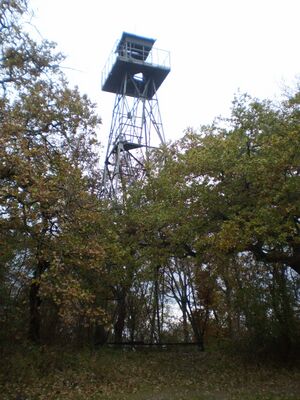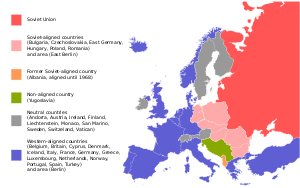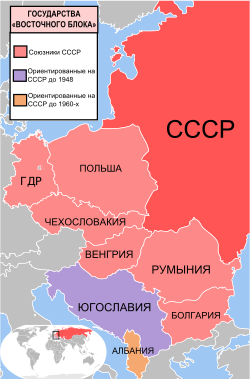Восточный блок
Восточный блок (англ. Eastern Bloc, социалистический блок (англ. Socialist Bloc), советский блок (англ. Soviet Bloc), коммунистический блок (англ. Communist Bloc)) — термин, использовавшийся на Западе во второй половине XX века для обозначения просоветских государств Центральной и Восточной Европы, Восточной и Юго-восточной Азии во главе с СССР[1][2][3], являвшихся государствами «второго мира».
В Европе восточный блок был представлен Албанией, Болгарией, Венгрией, ГДР, Польшей, Румынией и Чехословакией, в Азии — Кампучией, Китаем (до 1961 г.)[4][5][6][7][8], Лаосом, Монголией и Северной Кореей. С 1961 года в восточный блок вошла Куба.
История

Термин придуман после окончания Второй мировой войны на результат прихода к власти коммунистических и рабочих партий в государствах народной демократии. При этом не все государства региона, провозглашавшие себя социалистическими, входили в блок: Югославия шла отдельным от СССР путём с 1948 года (см. Советско-югославский раскол) и стала одним из инициаторов Движения неприсоединения, а Албания в 1960-е годы покинула объединения Восточного блока — СЭВ и ОВД (см. Советско-албанский раскол).
Блок Восточной Европы закончил своё существование после Падения Берлинской стены (9 ноября 1989 года) и «бархатной революции» в Чехословакии (17 ноября-29 декабря 1989 года), а также после объединения Германии в ночь на 3 октября 1990 года. 1 июля 1991 года на встрече в Праге была распущена Организация Варшавского договора, что подвело окончательную черту под существованием Восточного блока. В декабре 1991 года произошёл распад СССР, что привело к концу «Холодной войны» — 45-летнего противостояния между союзниками-победителями Второй Мировой войны — США, Великобританией и СССР.
Совет экономической взаимопомощи
Важнейшую интеграционную роль выполняли экономические структуры СЭВ.
Варшавский договор

Восточный блок был основан не только на идеологической и экономической близости социалистических государств, но также на соглашениях о коллективной взаимопомощи при потенциальном нападении блока НАТО. В 1955 году в НАТО вступила ФРГ; в ответ на это Албания, Болгария, Венгрия, ГДР, Польша, Румыния, Чехословакия и СССР подписали Варшавский Договор и образовали военный союз аналогичный НАТО — организацию Варшавского Договора (ОВД) во главе с СССР. В рамках союза проводились совместные учения и велась координация между разведками государств ОВД. После распада восточного блока существование ОВД потеряло смысл, а в 1991 году был подписан Протокол о полном прекращении действия Договора.
Телекоммуникации
Для нужд информации и связи государств блока функционировала телекоммуникационная сеть Восточный Берлин — Варшава — Прага — Москва, посредством которой осуществлялось телевещание на государства Восточной Европы, транслировались телевизионные передачи из Москвы, также сеть использовалась для фиксированной голосовой связи абонентов в указанных государствах. В 1963 году в Польше был введен в эксплуатацию крупнейший в Восточной Европе узел связи на 2 тыс. каналов передачи данных[9].
См. также
Примечания
- ↑ Hirsch, Donald; Kett, Joseph F. & Trefil, James S. (2002), The New Dictionary of Cultural Literacy, Houghton Mifflin Harcourt, с. 316, ISBN 0-618-22647-8
- ↑ Satyendra, Kush (2003), Encyclopaedic dictionary of political science, Sarup & Sons, с. 65, ISBN 81-7890-071-8.
- ↑ Compare: Janzen, Jörg; Taraschewski, Thomas. Cities of Pilgrimage / Shahshahānī, Suhaylā. — Münster: LIT Verlag, 2009. — Т. 4. — С. 190. — (Iuaes-series). — ISBN 9783825816186.. — «Until 1990, despite being a formally independent state, Mongolia had de facto been an integral part of the Soviet dominated Eastern Bloc.».
- ↑ Loth, Wilfried, The Division of the World, 1941—1955, Routledge, 1988, ISBN 0-415-00365-2, p. 297.
- ↑ Haggett, Peter, Encyclopedia of World Geography, Marshall Cavendish, 2001, ISBN 0-7614-7289-4, p. 1,850.
- ↑ Rees, G. Wyn. International Politics in Europe: The New Agenda, Routledge, 1993, ISBN 0-415-08282-X, p. 6.
- ↑ Satyendra, Kush (2003), Encyclopaedic Dictionary of Political Science, Sarup & Sons, с. 65, ISBN 978-81-7890-071-1
- ↑ Compare: Janzen, Jörg; Taraschewski, Thomas. Cities of Pilgrimage / Shahshahānī, Suhaylā. — Münster: LIT Verlag, 2009. — Т. 4. — С. 190. — (Iuaes-series). — ISBN 9783825816186.. — «Until 1990, despite being a formally independent state, Mongolia had de facto been an integral part of the Soviet-dominated Eastern Bloc.».
- ↑ Poland: New Communications Facility. // Military Review. — April 1963. — Vol. 43 — No. 4 — P. 106.
Литература
- Applebaum, Anne (2012), Iron Curtain: the Crushing of Eastern Europe, 1944-56, Allen Lane
- Beschloss, Michael R (2003), The Conquerors: Roosevelt, Truman and the Destruction of Hitler's Germany, 1941–1945, Simon and Schuster, ISBN 0-7432-6085-6
- Berthon, Simon & Potts, Joanna (2007), Warlords: An Extraordinary Re-creation of World War II Through the Eyes and Minds of Hitler, Churchill, Roosevelt, and Stalin, Da Capo Press, ISBN 0-306-81538-9
- Bideleux, Robert & Jeffries, Ian (2007), A History of Eastern Europe: Crisis and Change, Routledge, ISBN 0-415-36626-7
- Böcker, Anita (1998), Regulation of Migration: International Experiences, Het Spinhuis, ISBN 90-5589-095-2
- Brackman, Roman (2001), The Secret File of Joseph Stalin: A Hidden Life, Frank Cass Publishers, ISBN 0-7146-5050-1
- Cook, Bernard A. (2001), Europe Since 1945: An Encyclopedia, Taylor & Francis, ISBN 0-8153-4057-5
- Crampton, R. J. (1997), Eastern Europe in the twentieth century and after, Routledge, ISBN 0-415-16422-2
- Dale, Gareth (2005), Popular Protest in East Germany, 1945–1989: Judgements on the Street, Routledge, ISBN 0714654086
- Dowty, Alan (1989), Closed Borders: The Contemporary Assault on Freedom of Movement, Yale University Press, ISBN 0-300-04498-4
- Ericson, Edward E. (1999), Feeding the German Eagle: Soviet Economic Aid to Nazi Germany, 1933–1941, Greenwood Publishing Group, ISBN 0-275-96337-3
- Frucht, Richard C. (2003), Encyclopedia of Eastern Europe: From the Congress of Vienna to the Fall of Communism, Taylor & Francis Group, ISBN 0-203-80109-1
- Gaddis, John Lewis (2005), The Cold War: A New History, Penguin Press, ISBN 1-59420-062-9
- Goertz, Gary (1995), Contexts of International Politics, Cambridge University Press, ISBN 0-521-46972-4
- Grenville, John Ashley Soames (2005), A History of the World from the 20th to the 21st Century, Routledge, ISBN 0-415-28954-8
- Grenville, John Ashley Soames & Wasserstein, Bernard (2001), The Major International Treaties of the Twentieth Century: A History and Guide with Texts, Taylor & Francis, ISBN 0-415-23798-X
- Grogin, Robert C. (2001), Natural Enemies: The United States and the Soviet Union in the Cold War, 1917–1991, Lexington Books, ISBN 0-7391-0160-9
- Gorodetsky, Gabriel (2001), Grand Delusion: Stalin and the German Invasion of Russia, Yale University Press, ISBN 0300084595
- Hardt, John Pearce & Kaufman, Richard F. (1995), East-Central European Economies in Transition, M.E. Sharpe, ISBN 1-56324-612-0
- Harrison, Hope Millard (2003), Driving the Soviets Up the Wall: Soviet-East German Relations, 1953–1961, Princeton University Press, ISBN 0-691-09678-3
- Krasnov, Vladislav (1985), Soviet Defectors: The KGB Wanted List, Hoover Press, ISBN 0-8179-8231-0
- Lipschitz, Leslie & McDonald, Donogh (1990), German unification: economic issues, International Monetary Fund, ISBN 1-55775-200-1
- Lukacs, John (2006), June 1941: Hitler and Stalin, Yale University Press, ISBN 0-300-11437-0
- Maddison, Angus (2006), The world economy, OECD Publishing, ISBN 92-64-02261-9
- Michta, Andrew A. & Mastny, Vojtech (1992), East Central Europe after the Warsaw Pact: Security Dilemmas in the 1990s, Greenwood Press, ISBN 92-64-02261-9
- Miller, Roger Gene (2000), To Save a City: The Berlin Airlift, 1948–1949, Texas A&M University Press, ISBN 0-89096-967-1
- Miscamble, Wilson D. (2007), From Roosevelt to Truman: Potsdam, Hiroshima, and the Cold War, Cambridge University Press, ISBN 0-521-86244-2
- Murray, Williamson & Millett, Allan (2001), A War to be Won: Fighting the Second World War, Harvard University Press, ISBN 0-674-00680-1
- Myant, Martin & Drahokoupil, Jan (2010), Transition Economies: Political Economy in Russia, Eastern Europe, and Central Asia, Wiley-Blackwell, ISBN 978-0-470-59619-7
- Nekrich, Aleksandr Moiseevich; Ulam, Adam Bruno & Freeze, Gregory L. (1997), Pariahs, Partners, Predators: German–Soviet Relations, 1922–1941, Columbia University Press, ISBN 0-231-10676-9
- O'Connor, Kevin (2003), The history of the Baltic States, Greenwood Publishing Group, ISBN 0-313-32355-0
- O'Neil, Patrick (1997), Post-communism and the Media in Eastern Europe, Routledge, ISBN 0-7146-4765-9
- Olsen, Neil (2000), Albania, Oxfam, ISBN 0-85598-432-5
- Overy, R. J. (2004), The Dictators: Hitler's Germany and Stalin's Russia, W. W. Norton & Company, ISBN 0-393-02030-4
- Pearson, Raymond (1998), The Rise and Fall of the Soviet Empire, Macmillan, ISBN 0-312-17407-1
- Pollack, Detlef & Wielgohs, Jan (2004), Dissent and Opposition in Communist Eastern Europe: Origins of Civil Society and Democratic Transition, Ashgate Publishing, Ltd., ISBN 0-7546-3790-5
- Puddington, Arch (2003), Broadcasting Freedom: The Cold War Triumph of Radio Free Europe and Radio Liberty, University Press of Kentucky, ISBN 0-8131-9045-2
- Roberts, Geoffrey (2006), Stalin's Wars: From World War to Cold War, 1939–1953, Yale University Press, ISBN 0-300-11204-1
- Roberts, Geoffrey (2002), Stalin, the Pact with Nazi Germany, and the Origins of Postwar Soviet Diplomatic Historiography, vol. 4
- Saxonberg, Steven (2001), The Fall: A Comparative Study of the End of Communism in Czechoslovakia, East Germany, Hungary and Poland, Routledge, ISBN 90-5823-097-X
- Shirer, William L. (1990), The Rise and Fall of the Third Reich: A History of Nazi Germany, Simon and Schuster, ISBN 0-671-72868-7
- Smith, David James; Pabriks, Artis; Purs, Aldis & Lane, Thomas (2002), The Baltic States: Estonia, Latvia and Lithuania, Routledge, ISBN 0-415-28580-1
- Taagepera, Rein (1993), Estonia: Return to Independence, Westview Press, ISBN 0-8133-1703-7
- Teichova, Alice & Matis, Herbert (2003), Nation, State, and the Economy in History, Cambridge University Press, ISBN 0-521-79278-9
- Tucker, Robert C. (1992), Stalin in Power: The Revolution from Above, 1928–1941, W. W. Norton & Company, ISBN 0-393-30869-3
- Turner, Henry Ashby (1987), The Two Germanies Since 1945: East and West, Yale University Press, ISBN 0-300-03865-8
- Turnock, David (1997), The East European economy in context: communism and transition, Routledge, ISBN 0-415-08626-4
- Watry, David M. Diplomacy at the Brink: Eisenhower, Churchill, and Eden in the Cold War. Baton Rouge: Louisiana State University Press, 2014.
- Wegner, Bernd (1997), From Peace to War: Germany, Soviet Russia, and the World, 1939–1941, Berghahn Books, ISBN 1-57181-882-0
- Weinberg, Gerhard L. (1995), A World at Arms: A Global History of World War II, Cambridge University Press, ISBN 0-521-55879-4
- Wettig, Gerhard (2008), Stalin and the Cold War in Europe, Rowman & Littlefield, ISBN 0-7425-5542-9
- Williams, Kieran (1997), The Prague Spring and its Aftermath: Czechoslovak Politics, 1968–1970, Cambridge University Press, ISBN 0-521-58803-0
- Петров Н. В. Сталин и органы НКВД-МГБ в советизации стран Центральной и Восточной Европы. 1945—1953 гг. Архивная копия от 1 июня 2014 на Wayback Machine, 2008.
Ссылки
- Photographs of Russia in 1967. Архивировано 31 января 2008 года.
- Candid photos of the Eastern Bloc Архивная копия от 27 апреля 2006 на Wayback Machine September-December 1991
- Photographic project «Eastern Bloc» «Eastern Bloc» examines the specificities and differences of living in totalitarian and post totalitarian countries. The project is divided into chapters, each dedicated to one of the Eastern European countries—Slovak Republic, Poland, ex-GDR, Hungary, Czech Republic and ex-Yugoslavia.
- The Lives of Others official website Архивная копия от 24 ноября 2020 на Wayback Machine
- RFE Czechoslovak Unit Open Society Archives, Budapest
- Museum of occupations of Estonia Архивная копия от 5 мая 2012 на Wayback Machine — Project by the Kistler-Ritso Estonian Foundation
- Gallery of events from Poznań 1956 protests
- OSA Digital Archive Videos of the 1956 Hungarian Revolution
- RADIO FREE EUROPE Research, RAD Background Report/29: (Hungary) 20 October 1981, A CHRONOLOGY OF THE HUNGARIAN REVOLUTION, 23-4 October November 1956, compiled by RAD/Hungarian Section-Published accounts
- The Berlin Airlift. American Experience. Дата обращения: 5 марта 2007. Архивировано 21 июля 2013 года. — A PBS site on the context and history of the Berlin Airlift.
- 1961 JFK speech clarifying limits of American protection during the 1961 Berlin Wall crisis. Архивировано 19 февраля 2006 года.
- Berlin 1983: Berlin and the Wall in the early 1980s. Архивировано 28 сентября 2007 года.
